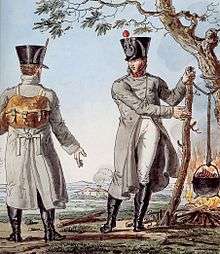Greatcoat
- "Shinel" redirects here. For a short story by Nikolai Gogol, see "The Overcoat"

A greatcoat, also known as a watchcoat, is a large overcoat that is typically made of wool designed for warmth and protection against the weather. Its collar and cuffs can be turned out to protect the face and hands from cold and rain, and the short cape around the shoulders provides extra warmth and repels rainwater (if made of a waterproof material). During the 17th and 18th centuries and the Industrial Revolution, greatcoats became available for all social classes. It was popular in the 19th century as a military uniform and casual wear for the wealthy, and is still issued for inclement weather by many armed forces around the world.
The coat generally hangs down below the knees and the cape is kept short, normally just above or below the elbows. It also sports deep pockets for keeping letters and food dry. It is typically coloured grey, though other colours may be used (e.g. black, brown, navy blue). One type of greatcoat is the Petersham (named after Viscount Petersham[1]).
Gallery
-
1812 French dragoon greatcoat with cloak
-
_with_a_shotgun%2C_in_a_greatcoat%2C_circa_1890.jpg)
William Fane De Salis (1812-1896) with a shotgun, c. 1890, (Dawley Court, Middlesex, UK).
-

Post-World War II German greatcoats
-

Greatcoats worn by Russian Border Guards being reviewed by President Vladimir Putin at a military parade
-

Royal Air Force officers wearing greatcoats, inspecting an aircraft in France
-

Winston Churchill and Joseph Stalin wearing greatcoats at Yalta, 1945
-
.jpg)
Fictional character Jack Harkness is known for wearing a greatcoat
-
.jpg)
A sentry of the Coldstream Guards at the Tower of London in a greatcoat in December 2011
See also
References
- ↑ "The Free Dictionary". Retrieved 16 May 2013.
| ||||||||||||||||||||||||||||||||||||||||||||||||||||||||||||||||||||||||